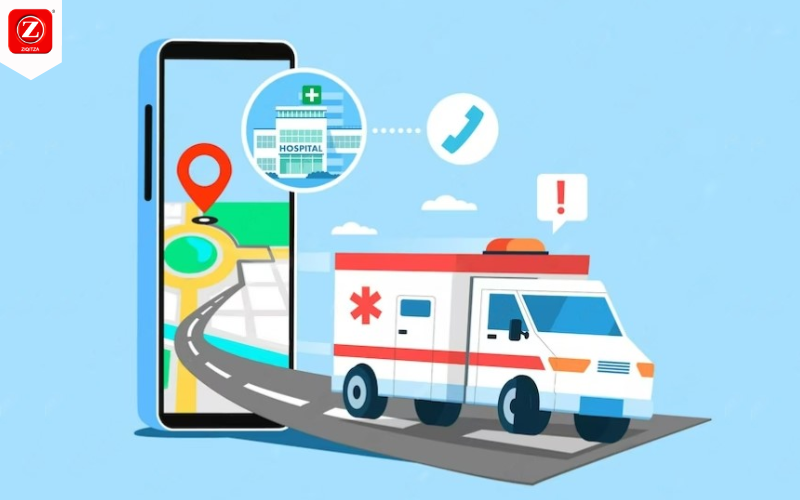In moments of crisis, every second counts. When faced with a medical emergency, the swift arrival of an ambulance can often mean the difference between life and death. However, the reality is that ambulance response times vary significantly based on geographic location, a critical factor that can greatly impact outcomes for patients in need. In this blog, we delve into the complexities surrounding ambulance response times, focusing particularly on the role of Ziqitza Healthcare Ltd., a leading emergency ambulance service provider, in addressing this challenge.
Understanding Ambulance Response Times
The urgency of medical emergencies necessitates a rapid response from emergency medical services (EMS). Ambulance response times refer to the duration it takes for an ambulance to reach the scene of an emergency after receiving a distress call. Various factors influence these response times, including population density, traffic conditions, infrastructure, and the availability of EMS resources.
The Urban-Rural Dynamics
The urban-rural dynamics present a multifaceted challenge in the realm of ambulance response times. Urban centers, characterized by high population densities and bustling traffic, often pose logistical hurdles for ambulance services. Navigating through congested streets and negotiating traffic can significantly delay ambulance arrival times, risking the health and well-being of individuals in need of urgent medical attention.
Conversely, rural areas present a different set of challenges. With sparse populations spread across vast geographical expanses, ambulances may need to travel long distances to reach remote villages or isolated communities. Poor road infrastructure, rugged terrain, and limited access to emergency medical facilities further compound the difficulties faced by ambulance services operating in rural regions.
Ziqitza: Bridging the Gap
In India, where the population resides in both urban centers and remote rural areas, addressing disparities in ambulance response times is paramount. This is where Ziqitza Limited, by Sweta Mangal, emerges as a key player in bridging the gap between demand and supply of emergency medical services.
In urban settings, Ziqitza Healthcare employs a range of strategies to navigate the complex landscape of ambulance response times. Leveraging advanced dispatch systems integrated with real-time traffic monitoring, Ziqitza optimizes ambulance routes to minimize delays caused by congestion. Additionally, the strategic placement of ambulance hubs in key locations allows for quicker deployment of medical assistance to high-demand areas.
In rural areas, Ziqitza Rajasthan adopts a proactive approach to overcome the challenges associated with long-distance travel and limited infrastructure. Mobile technology plays a pivotal role in optimizing ambulance deployment, with GPS-enabled tracking systems enabling efficient routing and navigation through remote terrain. Ziqitza Rajasthan extends the reach of its services to remote areas where formal ambulance access may be limited. This grassroots approach not only enhances response times but also fosters community resilience in the face of medical emergencies.
Innovative Solutions for Improved Response Times
Sweta Mangal Ziqitza employs a range of innovative solutions to enhance ambulance response times. Leveraging GPS technology, Ziqitza’s dispatch centers efficiently allocate ambulances based on proximity to the emergency location, minimizing travel time. Additionally, Ziqitza collaborates with local authorities and utilizes data analytics to identify high-demand areas and strategically station ambulances for quicker responses.
Challenges and Future Outlook
As Sweta Mangal and Ziqitza Health Care Limited continue their mission to enhance ambulance response times across diverse geographic landscapes, collaborative efforts between stakeholders remain paramount. Government agencies, private sector partners, healthcare providers, and community organizations must work together to address systemic challenges and implement sustainable solutions that ensure equitable access to timely emergency medical care for all.
By harnessing the power of innovation, leveraging technology, and fostering community engagement, we can strive toward a future where geographic location no longer affects the outcome of medical emergencies. Ziqitza Healthcare Ltd. leads the charge towards a more resilient and inclusive healthcare system where every life is valued and protected, regardless of where they reside.
Conclusion
Geographic location exerts a significant influence on ambulance response times, shaping outcomes for individuals in medical emergencies. Ziqitza Healthcare Ltd. stands at the forefront of efforts to mitigate disparities in response times, employing innovative strategies to ensure prompt medical assistance reaches communities, regardless of their location. As we navigate the complexities of emergency medical services, it is important to recognize the critical role played by organizations like Ziqitza Limited in safeguarding lives and fostering healthier communities.


